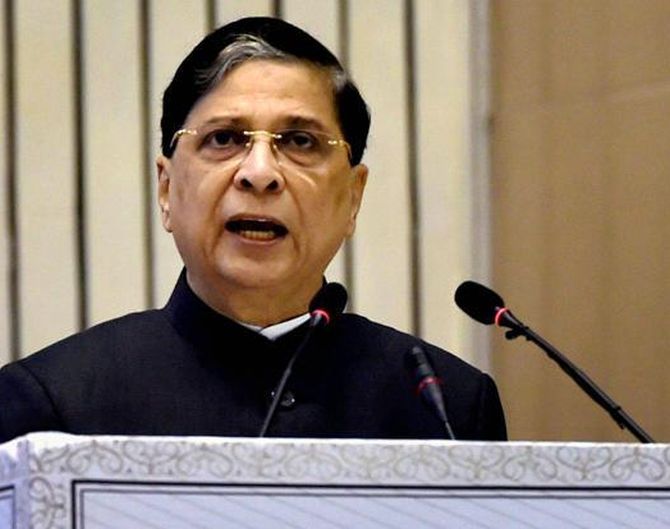The apex court said that it is the prerogative of the CJI to allocate cases and nominate benches.

The chief justice of India is the “master of the roster” and there is no dispute that he has the “ultimate authority” and “prerogative” to allocate cases, the Supreme Court asserted on Friday, in third such reiteration by the apex court in eight months on the contentious issue.
A bench of justices A K Sikri and Ashok Bhushan in their separate but concurring verdicts noted that being the senior-most judge, the CJI is empowered to exercise ‘leadership” on the court and in this role, he is expected to be the “spokesperson and representative” of the judiciary in its dealings with the executive, the government and the community.
Referring to several earlier verdicts of the apex court, including a judgment by a five-judge Constitution bench and a three-judge bench, justice Sikri said the CJI has the authority and responsibility for administration of the court and this gives him the “ultimate authority for determining the distribution of judicial work load”.
Justice Bhushan also said the law laid down earlier by the apex court makes it clear that allocation of business of the court by the CJI “not only flows from the constitutional provisions but is held to be prerogative of the Chief Justice and which is a convention followed from the very beginning”.
In his 41-page verdict, Justice Sikri said, “There is no dispute...that ‘Chief Justice’ is the master of roster and has the authority to allocate the cases to different benches/judges of the Supreme Court. The petitioner (former law minister Shanti Bhushan) has been candid in conceding to this legal position.”
Similarly, Justice Bhushan, who also penned a 41-page verdict, said, “The conventions and practice of the Supreme Court are time tested...(and) have ripened with time which need not to be tinkered with or imitated from different international practices of different courts.
The verdict came on a plea of senior lawyer Shanti Bhushan challenging the existing roster practice of allocation of cases by the CJI. It was also argued that the allocation of cases should be done by the apex court Collegium consisting of five-senior most judges.
Dismissing his arguments, the bench said the CJI’s role cannot be interpreted to include the Collegium when it comes to the allocation of work as it will make day-to-day functioning difficult.
The bench also said no system was “fool-proof” and there was always a scope for improvement and the Supreme Court cannot be an exception to this objective and goal.
Referring to an earlier verdict of the top court, Justice Sikri said, “This judgment, in no uncertain terms, holds that the ‘Chief Justice’ in his individual capacity is the Master of Roster and it cannot read as collegium of first three or five judges. Thus, it is his prerogative to constitute the benches and allocate the subjects which would be dealt with by the respective benches.”
He said that the CJI, being the first among equals, has two most obvious functions -- to exercise judicial power as a judge of the apex court on equal footing as others and to assume the responsibility of administration of court.
“The second stereotype is that being the ‘Chief Justice’ and senior-most judge of the court, he is empowered to exercise ‘leadership’ on the court. In this role, the ‘Chief Justice’ is expected to be the spokesperson and representative of the judiciary in its dealings with the Executive, Government and the Community,” Justice Sikri said.
He also made it clear that the power of the CJI does not extend to regulate the functioning of a particular bench to decide cases assigned to it.
“A bench comprising of puisne judges exercise its judicial function without interference from others, including the ‘Chief Justice’, as it is supposed to act according to the law. Therefore, when a particular matter is assigned to a particular bench, that bench acquires the complete dominion over the case,” Justice Sikri said.
He also noted in his verdict that the faith of the people was the “bed-rock on which the edifice of judicial review and efficacy of the adjudication are founded” and erosion of credibility of judiciary in the public mind was the greatest threat to the independence of judiciary.
The issue of allocation of cases by CJI Dipak Misra was highlighted by the four senior judges of the apex court during their unprecedented press conference where they expressed their unhappiness over the manner used by the CJI to assign important cases.
Justice Sikri agreed with the submissions of Attorney General K K Venugopal that the task of constitution of benches and allocation of specific cases to them could more smoothly be performed by the CJI and discharge of such a function by the Collegium would be “unworkable and also lead to many practical difficulties”.
“Moreover, when it comes to assigning the cases to a particular bench, it has to be undertaken by the Chief Justice on daily basis in contrast with the meetings of the Collegium for the purpose of appointment of Judges, which is infrequent. Thus, meeting of Collegium for the purpose of assigning the cases to a particular bench on daily basis is clearly impracticable,” he said.
Justice Bhushan also agreed with the submission of the attorney general that there shall be differences and hurdles in smooth distribution of work if the allocation of cases and constitution of benches would be given in “multiple hands”.










 © 2025
© 2025